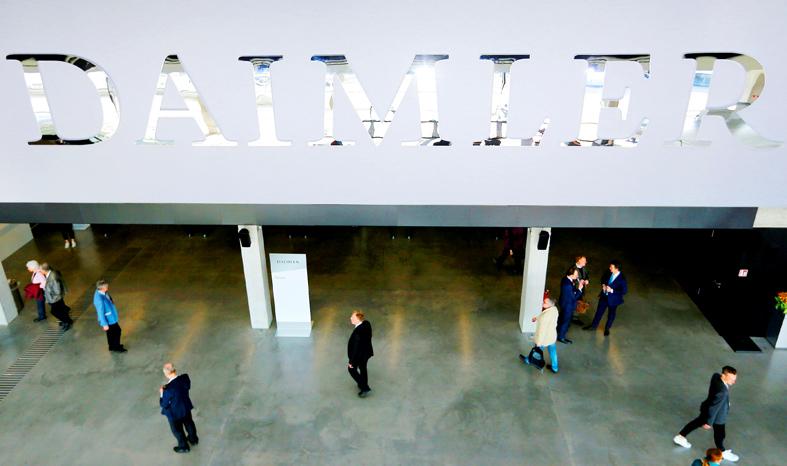Daimler AG yesterday said that early-year growth for its main Mercedes-Benz division would be erased by a global semiconductor shortage that the automaker expects to put a damper on the second half.
Mercedes vehicle sales are expected to be roughly flat this year rather than up significantly from last year. The lack of chips will have an adverse impact on the business as the year progresses and visibility on how supply would develop is low, Daimler said.
Rivals from Volkswagen AG to Jeep maker Stellantis NV have coped with the scarcity of chips better than initially feared, but also said that the issue would affect earnings later this year.

Photo: Reuters
Facing limitations on how many assembly lines they can keep running, automakers are prioritizing output of their biggest moneymakers and abstaining from discounts customers are accustomed to, even from luxury brands.
“The entire industry is currently struggling with longer delivery times, which unfortunately also affect our customers,” Daimler chief executive officer Ola Kallenius said. “We are doing what we can to minimize the impact.”
BMW AG, which has said it expects a “solid” increase in deliveries to customers this year, outsold Mercedes by more than 26,000 units in worldwide second-quarter sales and took over pole position in the US because of better access to chips.
Sales in the third quarter might be below the second quarter and could stabilize in the fourth quarter if no additional bottlenecks occur, Kallenius told analysts.
Despite the semiconductor shortage, Daimler’s second-quarter revenue came in better than analysts expected, climbing 44 percent to 43.5 billion euros (US$51.2 billion). The manufacturer also slightly raised the outlook for margins at its trucks and buses unit, and mobility division.
Earnings before interest and taxes surged to 5.19 billion euros, the company said, confirming preliminary numbers released last week. Profit margin at the cars and vans division reached double digits for a third straight quarter.
Daimler in April had forecast that Mercedes would be more profitable than it has been in years, thanks to resurgent vehicle demand in the midst of the COVID-19 pandemic. At the time, the company raised its projection for annual return on sales for its cars and vans division to 10 to 12 percent, up from 8 to 10 percent.
Executives were more somber this quarter, warning headwinds from raw material prices are poised to intensify in the second half and the company might not be able to compensate for that with efficiency gains like in the first six months.

South Korea’s equity benchmark yesterday crossed a new milestone just a month after surpassing the once-unthinkable 5,000 mark as surging global memory demand powers the country’s biggest chipmakers. The KOSPI advanced as much as 2.6 percent to a record 6,123, with Samsung Electronics Co and SK Hynix Inc each gaining more than 2 percent. With the benchmark now up 45 percent this year, South Korea’s stock market capitalization has also moved past France’s, following last month’s overtaking of Germany’s. Long overlooked by foreign funds, despite being undervalued, South Korean stocks have now emerged as clear winners in the global market. The so-called “artificial intelligence

NEW IDENTITY: Known for its software, India has expanded into hardware, with its semiconductor industry growing from US$38bn in 2023 to US$45bn to US$50bn India on Saturday inaugurated its first semiconductor assembly and test facility, a milestone in the government’s push to reduce dependence on foreign chipmakers and stake a claim in a sector dominated by China. Indian Prime Minister Narendra Modi opened US firm Micron Technology Inc’s semiconductor assembly, test and packaging unit in his home state of Gujarat, hailing the “dawn of a new era” for India’s technology ambitions. “When young Indians look back in the future, they will see this decade as the turning point in our tech future,” Modi told the event, which was broadcast on his YouTube channel. The plant would convert

‘SEISMIC SHIFT’: The researcher forecast there would be about 1.1 billion mobile shipments this year, down from 1.26 billion the prior year and erasing years of gains The global smartphone market is expected to contract 12.9 percent this year due to the unprecedented memorychip shortage, marking “a crisis like no other,” researcher International Data Corp (IDC) said. The new forecast, a dramatic revision down from earlier estimates, gives the latest accounting of the ongoing memory crunch that is affecting every corner of the electronics industry. The demand for advanced memory to power artificial intelligence (AI) tasks has drained global supply until well into next year and jeopardizes the business model of many smartphone makers. IDC forecast about 1.1 billion mobile shipments this year, down from 1.26 billion the prior

People stand in a Pokemon store in Tokyo on Thursday. One of the world highest-grossing franchises is celebrated its 30th anniversary yesterday.